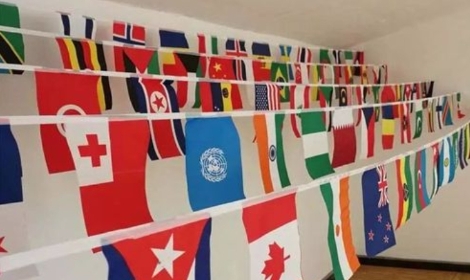如果我们没有季节会有什么影响?
正文翻译

What would happen if we didn't have seasons?
如果我们没有季节会有什么影响?

What would happen if we didn't have seasons?
如果我们没有季节会有什么影响?
评论翻译
Troy Cowan
What would happen to life on Earth if we did not have seasons?
Seasons are caused by the earth’s tilt. I don’t know if anyone has ever studied or has needed to study what would happen if the earth had no tilt. However, we can speculate. Without tilt, there would be no summer season and no winter season. The equator would always be hot and the poles would always be cold. If you start at the equator and move north, the further north you go the colder it would get. When you found a temperature zone you liked, you could stop. The daily temperature range would be about the same each day, every day, all year long.
The day and night would always be twelve hours long. The average amount of sleep needed each night would be longer than eight hours. People would probably have larger bladders to get them through the night.
如果地球没有季节会对地球上的生命产生什么影响呢?
季节是由地球的倾斜引起的。我不知道是否有人曾经研究过或需要研究如果地球没有倾斜会产生什么影响。然而,我们可以进行推测。没有倾斜,就不会有夏季和冬季。赤道永远会很热,而极地永远会很冷。如果你从赤道开始向北移动,越往北走就越冷。当你找到一个你喜欢的温度区域时,你可以停下来。每天的温度变化范围是一样的,每天都是一样的,一整年都是一样的。
白天和黑夜总是十二个小时。每晚所需的平均睡眠时间将超过8小时。人们可能会有更大的膀胱来度过夜晚。
There would be no deciduous trees and no hibernating animals. Trees would keep their leaves all year long. Animals would not have to sleep through the winter because there is no winter. No one would have to prepare for winter. All the preparations for winter would be unnecessary. Without this need for survival planning, people would probably less intelligent. Animals would still have their claws and teeth to survive but for humans, a larger brain would not be very helpful.
Heat from the sun would cause the water vapor at the equator to rise and the cold air at the poles to sink. This high and low air pressure would still cause rain showers to move across the land. In places, there could be wet and dry seasons.
In many respects, it would be a more comfortable planet.
没有落叶树,也没有需要冬眠的动物。树木一整年都保持着它们的叶子。没有冬天,动物也不用在冬天里睡觉了。没有人需要为冬天做准备,为冬天做的一切准备都是不必要的。如果不需要规划生存计划,人类可能会变得不那么聪明。动物为了生存仍然有爪子和牙齿,但对人类来说,更大的大脑并没有多大帮助
来自太阳的热量会导致赤道的水蒸气上升,而两极的冷空气下沉。这种高低气压仍然会导致阵雨在陆地上移动。在一些地方,可能有湿季和旱季。
在许多方面,它将是一个更舒适的星球。
Bryan Lamb
What would be different if the earth had no seasons?
The answer asserting that Earth should be “tidally locked” to the sun is completely wrong. This would be the case if the earth’s rotation period was 365 days!!!! If the earth had no seasons, this means only that it has no axis tilt. (Rather than 23 degrees that it currently is). this means, that there would be much less variation in climate at any particular place on the surface of the earth. the equator would “always” be the hottest place on earth, instead of what we currently have which is that the hottest place varies between the tropic of cancer and the tropic of capricorn depending on what month of the year it is. The coldest places would always be the poles. There would no longer be an arctic circle or an antarctic circle, and correspondingly no regions on earth where you would get light or dark for more than a day. All places on earth would basically have 12 hours of light and 12 hours of dark each day. The regions closer to the poles would still be colder, not due to the length of the day, but due mostly to the angle of the sun’s rays as they strike the surface. What would this mean for the average temperature of the earth? not much difference, but it would cause all locations in earth to have a much lower variation in temperature, which probably would mean less spread of different types of vegetation in different places. This could decrease biodiversity and make ecosystems less stable, but I’m not an ecologist. but the other answers are most definitely not by people who understand astronomy either.
如果地球没有季节,会有什么不同?
断言地球会被太阳“潮汐锁定”的答案是完全错误的。如果地球自转周期是365天的话,情况就是这样!如果地球没有季节,这只意味着它的地轴没有倾斜。(而不是目前的23度)。这意味着,在地球表面的任何特定地方,气候的变化都要小得多。赤道将“永远”是地球上最热的地方,而不是我们现在看到的最热的地方在北回归线和南回归线之间,这取决于它是一年中的哪个月份。最冷的地方永远是两极。北极圈和南极圈将不复存在,相应地,地球上也没有哪个地区的白昼或黑夜会超过一天。地球上所有的地方基本上每天都有12小时的光明和12小时的黑暗。靠近两极的地区仍然会更冷,这不是由于一天的长度,而主要是由于太阳光线照射到地球表面时的角度。这对地球的平均温度意味着什么?差别不大,但它会使地球上所有地方的温度变化都小得多,这可能意味着不同类型的植被在不同地方的传播会减少。这可能会减少生物多样性,使生态系统不那么稳定,但我不是生态学家。但其他答案肯定也不是懂天文学的人给出的。
David Colantuono
What would happen if there was no more summer?
There would no longer be oppressive heat and humidity that makes many people very uncomfortable. That might be bad for heat lovers that obsess about such horrible conditions, but for the rest of us who hate hot weather, that would be better.
Crops and plants can still grow in Spring. Spring is generally a milder season than Summer and you don’t need it 90°F or higher with tropical rainforest humidity for crops and plants to grow.
There would be less fatalities due to heat stroke and fewer hot car deaths if there was no more Summer. How can one possibly argue with that? People actually WANT more heat-related deaths?
如果没有更多的夏天,会有什么影响?
再也不会有让很多人感到不舒服的闷热和潮湿气候了。对于那些痴迷于这种可怕天气的炎热爱好者来说,这可能是件坏事,但对于我们这些讨厌炎热天气的人来说,这可能会更好。
春季仍然可以生长作物和植物。春季通常比夏季温和,作物和植物并不需要像热带雨林那样的高温(90°F或更高)和湿度来生长。
如果没有夏天,死于中暑和死于汽车热的人数就会减少。你怎么能反驳呢?人们真的想要更多与热有关的死亡吗?
Kim Carlisle
Will seasons ever disappear?
As long as there is wind and the earth still rotates; as long as there is sun and the earth still revolves around it; as long as there is air and water vapor in it; and as long as there are latitudes and protective strata above the earth, there will be seasons.
Disastrous cosmological events can happen, though, in which not only the seasons will disappear, but also those of us who are in awe of it.
季节会消失吗?
只要有风,地球仍在旋转;只要有太阳,地球仍然围绕着它旋转;只要里面有空气和水蒸气;只要地球上方有纬度和保护层,就会有季节。
然而,灾难性的宇宙事件可能会发生,不仅季节会消失,我们这些敬畏它的人也会消失。
Corvi Zeman
What would happen if winter didn't happen (meaning that spring, summer and autumn became the only seasons)?
This might be minor, but one change would be the kinds of food we’d eat. Many temperate trees require a certain number of “chill hours” to properly create fruit or nuts. One chill hour is one hour the plant spends at a temperature below 7 degrees Celsius. So there’d be a lot fewer chill hours in a world without winter.
When it receives enough chill hours, the tree goes dormant. While it is dormant, chemical changes occur that will trigger flowering and fruiting once the tree is no longer dormant. Plants that don’t get enough chill hours screw up the fruiting process. Orange make weird green fruit that never gets ripe if they don’t get enough chill hours. Peaches won’t flower at all if they don’t get enough cold.
So in a world without winter, we’d lack apples, peaches, cherries, apricots, chestnuts, almonds, pears, blueberries, raspberries, currants, hazelnuts, kiwis, and walnuts. We’d still have tropical fruits and nuts like pineapple, cashews, and mangos. Citruses might be okay, their chill requirements are pretty low and autumn and spring might be enough chill for them.
Most of the major world crops (wheat, rice, maize, potatoes) are planted in spring and harvested in summer and fall, so they’d be okay without winter and I don’t think there’d be mass starvation.
People would notice apples were missing, though, they’re in the top 25 crops grown worldwide, and they need up to a thousand chill hours a year, which is a lot. There is some research and breeding - especially in Israel and California where people want to grow apple trees but can’t - creating “low chill” apple trees that do well without a lot of chill hours, but I don’t think they’re really ready yet.
如果没有冬天(意味着春天、夏天和秋天成为唯一的季节),会有什么影响?
这种可能性很小,一个变化是我们吃的食物种类。许多温带树木需要一定的“ 冷需期”才能结出果实或坚果。一小时的”冷需期“是指植物在低于7摄氏度的温度下度过的一小时。所以在一个没有冬天的世界里,”冷需期“会少得多。
当它受到足够的寒冷时,树就会进入休眠状态。当它处于休眠状态时,一旦树不再休眠,化学变化就会触发开花和结果。植物没有得到足够”冷需期“,会破坏结果过程。橙子是一种奇怪的绿色水果,如果没有足够的”冷需期“,它们就永远不会成熟。如果没有足够的寒冷,桃子根本不会开花。
因此,在一个没有冬天的世界里,我们会缺少苹果、桃子、樱桃、杏子、栗子、杏仁、梨、蓝莓、山竹、醋栗、榛子、奇异果和核桃。我们仍然会吃热带水果和坚果,比如菠萝、腰果和芒果。柑橘可能还好,它们对寒冷的要求很低,秋天和春天对它们来说已经足够冷了。
世界上大多数主要作物(小麦、水稻、玉米、土豆)都在春天种植,在夏天和秋天收获,所以没有冬天也没问题,我认为不会出现大规模饥饿。
然而,人们会注意到苹果不见了,它们是全球种植量最高的25种作物之一,每年需要1000个”冷需期“,这是一个很大的数字。有一些研究和育种——特别是在以色列和加利福尼亚,那里的人们想种植苹果树,但不能种植——创造了“低冷需期“苹果树,这种苹果树在没有很多寒冷时间的情况下也能长得很好,但我认为它们还没有真正准备好。
Ian Johnston
What would happen if the only seasons Earth had were spring and fall?
Here’s a funny little secret in astronomy– There is no such thing as spring and autumn. They’re transitory periods we made up to describe the weather warming and cooling as we march on towards the solstices. When we talk about seasons, there’s really only two: summer and winter. Summer is when whichever pole you are closest to is the one pointing towards the sun, and winter is when it points away.
Spring and autumn are seasons in the same way that dusk and dawn are times of the day. Realistically, they don’t mean much because it’s either day (the sun is up) or night (the sun is down), and everything else (Noon, midnight, etc.) are just terms we’ve made up to describe certain points along this cycle.
Still, from a climatic point, I can answer your question in a way that’ll hopefully satisfy. Theoretically, if the planet had a lower obliquity, say half the current 23.4o down to 11.7o, those in the temperate regions would experience a phenomenon like the one you’re wondering about. With milder winters but weaker summers, growing seasons would likely be affected to be shorter.
如果地球只有春天和秋天,会有什么影响?
这是天文学中一个有趣的小秘密——没有春秋这回事。它们是我们编造出来的过渡时期,用来描述我们走向至日时天气的变暖和变冷。当我们谈论季节时,实际上只有两个:夏天和冬天。夏天是你离太阳最近的极点指向太阳的时候,冬天是它指向太阳的时候。
春天和秋天是季节,就像黄昏和黎明是一天中的时间一样。事实上,它们意义不大,因为要么是白天(太阳升起),要么是夜晚(太阳落下),其他一切(中午、午夜等)都只是我们用来描述这个周期中某些点的术语。
不过,从气候的角度来看,我可以用一种让你满意的方式回答你的问题。从理论上讲,如果地球的倾角较低,比如从现在的23.40度减半到11.70度,温带地区的人就会经历你想知道的现象。随着冬天变暖,夏天变弱,生长季节可能会缩短。
On a more important note, much of these temperate regions would be more arid, as areas such as my native New York get much of their environmental water from snowmelts. Areas that see some snow in the winter might get none at all, meanwhile those which get large amounts would see less. Rain evaporates much faster than snow melts and infuses the ground, resulting in less vegetation growth in the temperate latitudes.
In this new world, the northern United States, which is heavily forested, might instead be a large savannah. The Great Plains could instead be a vast desert, arid and cool, like those in Central Asia. At the poles, the ice caps would be larger and more stable, with a briefer melt period in their summer. Meanwhile, life in the tropics would much the same, as their seasonal changes are generally mild already.
In summary, with a lower axial tilt, Earth would be a much more arid, sedate planet, with fewer extreme weather events caused by the smaller temperature range and a much smaller temperate band. The current temperate regions would be mostly grasslands and steppes separated by large, cool deserts in the continental interiors.
更重要的是,这些温带地区的大部分地区将更加干旱,因为像我的家乡纽约这样的地区的大部分环境用水来自融雪。在冬天看到一些雪的地区可能根本没有雪了,而那些雪量大的地区会看到雪就更少了。雨水蒸发的速度比雪融化的速度快得多,水还要注入地面,导致温带地区植被生长较少。
在这个新的世界里,森林茂密的美国北部可能会变成一片大草原。大平原可能变成一片广袤的沙漠,干旱而凉爽,就像中亚那样。在两极,冰盖会更大更稳定,夏季的融化期也会更短。与此同时,热带地区的生活将大致相同,因为他们的季节变化通常已经很温和了。
总之,如果轴向倾角较低,地球将是一个更加干旱、平静的星球,由较小的温度范围和较小的温带引起的极端天气事件将更少。目前的温带地区大部分会变成由大片草原和草原分隔的大片凉爽的沙漠。
K Vopalecky
What would happen if there were no winters anymore due to climate change/global warming? How would that affect our lives on Earth as well as other living things on Earth (plants, animals)?
It's unlikely climate change will make winter weather disappear any time soon, except in regions closer to the equator.
Scientific research is leaning toward the conclusion that, as long as the polar region remains colder in winter, the weakening jet steam will allow more dreaded polar vortexes to swing south and stick around longer, bringing longer cold snaps and more snow.
Something else to consider is the increasing summer heat. Climatological models are showing that over the next fifty years, hotter temperatures combined with more intense humidity will make large swathes of the globe lethal to live in.
如果由于气候变化/全球变暖而不再有冬天会有什么影响?这将如何影响我们在地球上的生活以及地球上的其他生物(植物,动物)?
除了靠近赤道的地区,气候变化不太可能在短期内使冬季天气消失。
科学研究倾向于得出这样的结论:只要极地地区在冬季保持寒冷,减弱的喷射蒸汽将允许更多可怕的极地涡旋向南摆动并停留更长时间,带来更长时间的寒流和更多的降雪。
另一件需要考虑的事情是夏季越来越热。气候模型显示,在接下来的50年里,更高的温度加上更强的湿度将使地球上的大片地区无法生存。
Growing numbers of people will be forced to flee the tropics and formerly arable lands and these huge populations will need to seek new homes. This migration has already begun as streams of people are fleeing drought-hit areas in Latin America, Africa and Asia where farming and other rural livelihoods have become impossible because of drought.
The number of climate-change migrants has doubled globally over the past decade, and the issue of what to do about rapidly increasing populations of displaced people will only become greater and more urgent as the planet heats.
In the coming years, regions north of the 45°N parallel—which runs through Michigan, France, Croatia, Mongolia and xinjiang in China — will be the twenty-first century’s booming haven. This global-spanning band represents 15% of the planet’s area but holds 29% of its ice--free land, and is currently home to a small fraction of the world’s (aging) people. It will soon offer the optimum climate for human productivity with mean average temperatures of around 13°C.
越来越多的人将被迫逃离热带地区和以前的耕地,这些庞大的人口将需要寻找新的家园。随着大批人口逃离拉丁美洲、非洲和亚洲的干旱地区,这种移民已经开始迁移——因为干旱,农业和其他农村生计变得不可能。
在过去十年中,全球因气候变化移民的数量翻了一番,随着地球变暖,如何应对迅速增加的流离失所者的问题只会变得越来越紧迫。
在未来的几年里,北纬45度以北的地区——包括密歇根州、法国、克罗地亚、蒙古和中国新疆——将成为21世纪蓬勃发展的避风港。这片横跨全球的带状地带占地球面积的15%,但拥有29%的无冰土地,目前是世界上一小部分(老龄化)人口的家园。它将很快为人类生产力提供最佳气候,平均温度约为13°C。
Nigel Arnot
If a planet didn't have seasons, would that be better or worse for life?
We don't know, There are places on earth where the seasons are almost undetectable. Pacific islands close to the Equator and outside any seasonal weather patterns/ monsoons. Anyway, life evolves to be best fitted to its environment.
To get no seasons you would need both a circular orbit around the star and a vertical axis of rotation. A vertical axis but an elliptical orbit would quite certainly have seasons.
Even without any seasons, temperature would still vary with latitude. Hottest at the equator, coldest at the poles. Midday sun coming from near the horizon is spread more thinly on the ground, than midday sun from vertically overhead.
如果一个行星没有季节,这对生命来说是好还是坏呢?
我们不知道,地球上有些地方季节几乎不可察觉,比如赤道附近的太平洋岛屿,不受任何季节性天气模式/季风的影响。无论如何,生命会逐渐适应其环境。
要达到没有季节的状态,你需要围绕恒星做圆形轨道并且有垂直的旋转轴。垂直轴但椭圆轨道几乎肯定会有季节。
即使没有任何季节,温度仍然会随着纬度的变化而变化。赤道最热,极地最冷。正午太阳从地平线附近照射的热量比正午太阳从垂直上方照射的要稀薄。
Judy Kanarek
If a planet didn't have seasons, would that be better or worse for life?
You asked if a planet didn’t have seasons, I am assuming you mean planet earth and would it be better or worse for life if we didn’t have seasons. The reason the earth has seasons is because the earth is tilted at 23.5 degrees has it loops around the sun. Earth collided with other planets and the moon and caused the earth’s tilt. Depending where on earth is tilted towards the sun would mean all of the other countries would be have the same climate everyday, the countries that have winter wouldn’t be able to grow crops that were meant to grow only during the spring or summer. The countries that have summer everyday would need more water to drink and water the plants and crop. There are many variables when there are no seasons. But basically life would be worse off if we didn’t have seasons because we need them to evenly distribute the seasons on earth. Seasons is what makes life thrive on earth. Most importantly we cannot change the tilt of the earth it’s permanent. So life would be worse of without the seasons.
如果一个星球没有季节,对生命来说是好是坏?
你问到如果一个行星没有季节,我假设你指的是地球,如果我们没有季节,对生命来说是好是坏。地球之所以有季节,是因为地球以23.5度的角度围绕太阳旋转。地球曾与其他行星和月球相撞,导致地球倾斜。这取决于地球的哪个方向是向太阳倾斜的,这意味着其他所有国家每天都会有相同的气候,而那些始终处于冬季的国家将无法种植只能在春季或夏季生长的农作物。每天都是夏季的国家将需要更多的水来饮用、浇灌植物和作物。没有季节,就会有很多变数,但基本上,如果我们没有季节,生命会变得更糟,因为我们需要季节来平衡地球上的季节。季节是让地球上的生命茁壮成长的原因。最重要的是,我们无法改变地球的倾斜,这是永久性的。所以没有季节的话,生命将会更糟。
Troy Cowan
What would happen to life on Earth if we did not have seasons?
Seasons are caused by the earth’s tilt. I don’t know if anyone has ever studied or has needed to study what would happen if the earth had no tilt. However, we can speculate. Without tilt, there would be no summer season and no winter season. The equator would always be hot and the poles would always be cold. If you start at the equator and move north, the further north you go the colder it would get. When you found a temperature zone you liked, you could stop. The daily temperature range would be about the same each day, every day, all year long.
The day and night would always be twelve hours long. The average amount of sleep needed each night would be longer than eight hours. People would probably have larger bladders to get them through the night.
如果地球没有季节会对地球上的生命产生什么影响呢?
季节是由地球的倾斜引起的。我不知道是否有人曾经研究过或需要研究如果地球没有倾斜会产生什么影响。然而,我们可以进行推测。没有倾斜,就不会有夏季和冬季。赤道永远会很热,而极地永远会很冷。如果你从赤道开始向北移动,越往北走就越冷。当你找到一个你喜欢的温度区域时,你可以停下来。每天的温度变化范围是一样的,每天都是一样的,一整年都是一样的。
白天和黑夜总是十二个小时。每晚所需的平均睡眠时间将超过8小时。人们可能会有更大的膀胱来度过夜晚。
There would be no deciduous trees and no hibernating animals. Trees would keep their leaves all year long. Animals would not have to sleep through the winter because there is no winter. No one would have to prepare for winter. All the preparations for winter would be unnecessary. Without this need for survival planning, people would probably less intelligent. Animals would still have their claws and teeth to survive but for humans, a larger brain would not be very helpful.
Heat from the sun would cause the water vapor at the equator to rise and the cold air at the poles to sink. This high and low air pressure would still cause rain showers to move across the land. In places, there could be wet and dry seasons.
In many respects, it would be a more comfortable planet.
没有落叶树,也没有需要冬眠的动物。树木一整年都保持着它们的叶子。没有冬天,动物也不用在冬天里睡觉了。没有人需要为冬天做准备,为冬天做的一切准备都是不必要的。如果不需要规划生存计划,人类可能会变得不那么聪明。动物为了生存仍然有爪子和牙齿,但对人类来说,更大的大脑并没有多大帮助
来自太阳的热量会导致赤道的水蒸气上升,而两极的冷空气下沉。这种高低气压仍然会导致阵雨在陆地上移动。在一些地方,可能有湿季和旱季。
在许多方面,它将是一个更舒适的星球。
Bryan Lamb
What would be different if the earth had no seasons?
The answer asserting that Earth should be “tidally locked” to the sun is completely wrong. This would be the case if the earth’s rotation period was 365 days!!!! If the earth had no seasons, this means only that it has no axis tilt. (Rather than 23 degrees that it currently is). this means, that there would be much less variation in climate at any particular place on the surface of the earth. the equator would “always” be the hottest place on earth, instead of what we currently have which is that the hottest place varies between the tropic of cancer and the tropic of capricorn depending on what month of the year it is. The coldest places would always be the poles. There would no longer be an arctic circle or an antarctic circle, and correspondingly no regions on earth where you would get light or dark for more than a day. All places on earth would basically have 12 hours of light and 12 hours of dark each day. The regions closer to the poles would still be colder, not due to the length of the day, but due mostly to the angle of the sun’s rays as they strike the surface. What would this mean for the average temperature of the earth? not much difference, but it would cause all locations in earth to have a much lower variation in temperature, which probably would mean less spread of different types of vegetation in different places. This could decrease biodiversity and make ecosystems less stable, but I’m not an ecologist. but the other answers are most definitely not by people who understand astronomy either.
如果地球没有季节,会有什么不同?
断言地球会被太阳“潮汐锁定”的答案是完全错误的。如果地球自转周期是365天的话,情况就是这样!如果地球没有季节,这只意味着它的地轴没有倾斜。(而不是目前的23度)。这意味着,在地球表面的任何特定地方,气候的变化都要小得多。赤道将“永远”是地球上最热的地方,而不是我们现在看到的最热的地方在北回归线和南回归线之间,这取决于它是一年中的哪个月份。最冷的地方永远是两极。北极圈和南极圈将不复存在,相应地,地球上也没有哪个地区的白昼或黑夜会超过一天。地球上所有的地方基本上每天都有12小时的光明和12小时的黑暗。靠近两极的地区仍然会更冷,这不是由于一天的长度,而主要是由于太阳光线照射到地球表面时的角度。这对地球的平均温度意味着什么?差别不大,但它会使地球上所有地方的温度变化都小得多,这可能意味着不同类型的植被在不同地方的传播会减少。这可能会减少生物多样性,使生态系统不那么稳定,但我不是生态学家。但其他答案肯定也不是懂天文学的人给出的。
David Colantuono
What would happen if there was no more summer?
There would no longer be oppressive heat and humidity that makes many people very uncomfortable. That might be bad for heat lovers that obsess about such horrible conditions, but for the rest of us who hate hot weather, that would be better.
Crops and plants can still grow in Spring. Spring is generally a milder season than Summer and you don’t need it 90°F or higher with tropical rainforest humidity for crops and plants to grow.
There would be less fatalities due to heat stroke and fewer hot car deaths if there was no more Summer. How can one possibly argue with that? People actually WANT more heat-related deaths?
如果没有更多的夏天,会有什么影响?
再也不会有让很多人感到不舒服的闷热和潮湿气候了。对于那些痴迷于这种可怕天气的炎热爱好者来说,这可能是件坏事,但对于我们这些讨厌炎热天气的人来说,这可能会更好。
春季仍然可以生长作物和植物。春季通常比夏季温和,作物和植物并不需要像热带雨林那样的高温(90°F或更高)和湿度来生长。
如果没有夏天,死于中暑和死于汽车热的人数就会减少。你怎么能反驳呢?人们真的想要更多与热有关的死亡吗?
Kim Carlisle
Will seasons ever disappear?
As long as there is wind and the earth still rotates; as long as there is sun and the earth still revolves around it; as long as there is air and water vapor in it; and as long as there are latitudes and protective strata above the earth, there will be seasons.
Disastrous cosmological events can happen, though, in which not only the seasons will disappear, but also those of us who are in awe of it.
季节会消失吗?
只要有风,地球仍在旋转;只要有太阳,地球仍然围绕着它旋转;只要里面有空气和水蒸气;只要地球上方有纬度和保护层,就会有季节。
然而,灾难性的宇宙事件可能会发生,不仅季节会消失,我们这些敬畏它的人也会消失。
Corvi Zeman
What would happen if winter didn't happen (meaning that spring, summer and autumn became the only seasons)?
This might be minor, but one change would be the kinds of food we’d eat. Many temperate trees require a certain number of “chill hours” to properly create fruit or nuts. One chill hour is one hour the plant spends at a temperature below 7 degrees Celsius. So there’d be a lot fewer chill hours in a world without winter.
When it receives enough chill hours, the tree goes dormant. While it is dormant, chemical changes occur that will trigger flowering and fruiting once the tree is no longer dormant. Plants that don’t get enough chill hours screw up the fruiting process. Orange make weird green fruit that never gets ripe if they don’t get enough chill hours. Peaches won’t flower at all if they don’t get enough cold.
So in a world without winter, we’d lack apples, peaches, cherries, apricots, chestnuts, almonds, pears, blueberries, raspberries, currants, hazelnuts, kiwis, and walnuts. We’d still have tropical fruits and nuts like pineapple, cashews, and mangos. Citruses might be okay, their chill requirements are pretty low and autumn and spring might be enough chill for them.
Most of the major world crops (wheat, rice, maize, potatoes) are planted in spring and harvested in summer and fall, so they’d be okay without winter and I don’t think there’d be mass starvation.
People would notice apples were missing, though, they’re in the top 25 crops grown worldwide, and they need up to a thousand chill hours a year, which is a lot. There is some research and breeding - especially in Israel and California where people want to grow apple trees but can’t - creating “low chill” apple trees that do well without a lot of chill hours, but I don’t think they’re really ready yet.
如果没有冬天(意味着春天、夏天和秋天成为唯一的季节),会有什么影响?
这种可能性很小,一个变化是我们吃的食物种类。许多温带树木需要一定的“ 冷需期”才能结出果实或坚果。一小时的”冷需期“是指植物在低于7摄氏度的温度下度过的一小时。所以在一个没有冬天的世界里,”冷需期“会少得多。
当它受到足够的寒冷时,树就会进入休眠状态。当它处于休眠状态时,一旦树不再休眠,化学变化就会触发开花和结果。植物没有得到足够”冷需期“,会破坏结果过程。橙子是一种奇怪的绿色水果,如果没有足够的”冷需期“,它们就永远不会成熟。如果没有足够的寒冷,桃子根本不会开花。
因此,在一个没有冬天的世界里,我们会缺少苹果、桃子、樱桃、杏子、栗子、杏仁、梨、蓝莓、山竹、醋栗、榛子、奇异果和核桃。我们仍然会吃热带水果和坚果,比如菠萝、腰果和芒果。柑橘可能还好,它们对寒冷的要求很低,秋天和春天对它们来说已经足够冷了。
世界上大多数主要作物(小麦、水稻、玉米、土豆)都在春天种植,在夏天和秋天收获,所以没有冬天也没问题,我认为不会出现大规模饥饿。
然而,人们会注意到苹果不见了,它们是全球种植量最高的25种作物之一,每年需要1000个”冷需期“,这是一个很大的数字。有一些研究和育种——特别是在以色列和加利福尼亚,那里的人们想种植苹果树,但不能种植——创造了“低冷需期“苹果树,这种苹果树在没有很多寒冷时间的情况下也能长得很好,但我认为它们还没有真正准备好。
Ian Johnston
What would happen if the only seasons Earth had were spring and fall?
Here’s a funny little secret in astronomy– There is no such thing as spring and autumn. They’re transitory periods we made up to describe the weather warming and cooling as we march on towards the solstices. When we talk about seasons, there’s really only two: summer and winter. Summer is when whichever pole you are closest to is the one pointing towards the sun, and winter is when it points away.
Spring and autumn are seasons in the same way that dusk and dawn are times of the day. Realistically, they don’t mean much because it’s either day (the sun is up) or night (the sun is down), and everything else (Noon, midnight, etc.) are just terms we’ve made up to describe certain points along this cycle.
Still, from a climatic point, I can answer your question in a way that’ll hopefully satisfy. Theoretically, if the planet had a lower obliquity, say half the current 23.4o down to 11.7o, those in the temperate regions would experience a phenomenon like the one you’re wondering about. With milder winters but weaker summers, growing seasons would likely be affected to be shorter.
如果地球只有春天和秋天,会有什么影响?
这是天文学中一个有趣的小秘密——没有春秋这回事。它们是我们编造出来的过渡时期,用来描述我们走向至日时天气的变暖和变冷。当我们谈论季节时,实际上只有两个:夏天和冬天。夏天是你离太阳最近的极点指向太阳的时候,冬天是它指向太阳的时候。
春天和秋天是季节,就像黄昏和黎明是一天中的时间一样。事实上,它们意义不大,因为要么是白天(太阳升起),要么是夜晚(太阳落下),其他一切(中午、午夜等)都只是我们用来描述这个周期中某些点的术语。
不过,从气候的角度来看,我可以用一种让你满意的方式回答你的问题。从理论上讲,如果地球的倾角较低,比如从现在的23.40度减半到11.70度,温带地区的人就会经历你想知道的现象。随着冬天变暖,夏天变弱,生长季节可能会缩短。
On a more important note, much of these temperate regions would be more arid, as areas such as my native New York get much of their environmental water from snowmelts. Areas that see some snow in the winter might get none at all, meanwhile those which get large amounts would see less. Rain evaporates much faster than snow melts and infuses the ground, resulting in less vegetation growth in the temperate latitudes.
In this new world, the northern United States, which is heavily forested, might instead be a large savannah. The Great Plains could instead be a vast desert, arid and cool, like those in Central Asia. At the poles, the ice caps would be larger and more stable, with a briefer melt period in their summer. Meanwhile, life in the tropics would much the same, as their seasonal changes are generally mild already.
In summary, with a lower axial tilt, Earth would be a much more arid, sedate planet, with fewer extreme weather events caused by the smaller temperature range and a much smaller temperate band. The current temperate regions would be mostly grasslands and steppes separated by large, cool deserts in the continental interiors.
更重要的是,这些温带地区的大部分地区将更加干旱,因为像我的家乡纽约这样的地区的大部分环境用水来自融雪。在冬天看到一些雪的地区可能根本没有雪了,而那些雪量大的地区会看到雪就更少了。雨水蒸发的速度比雪融化的速度快得多,水还要注入地面,导致温带地区植被生长较少。
在这个新的世界里,森林茂密的美国北部可能会变成一片大草原。大平原可能变成一片广袤的沙漠,干旱而凉爽,就像中亚那样。在两极,冰盖会更大更稳定,夏季的融化期也会更短。与此同时,热带地区的生活将大致相同,因为他们的季节变化通常已经很温和了。
总之,如果轴向倾角较低,地球将是一个更加干旱、平静的星球,由较小的温度范围和较小的温带引起的极端天气事件将更少。目前的温带地区大部分会变成由大片草原和草原分隔的大片凉爽的沙漠。
K Vopalecky
What would happen if there were no winters anymore due to climate change/global warming? How would that affect our lives on Earth as well as other living things on Earth (plants, animals)?
It's unlikely climate change will make winter weather disappear any time soon, except in regions closer to the equator.
Scientific research is leaning toward the conclusion that, as long as the polar region remains colder in winter, the weakening jet steam will allow more dreaded polar vortexes to swing south and stick around longer, bringing longer cold snaps and more snow.
Something else to consider is the increasing summer heat. Climatological models are showing that over the next fifty years, hotter temperatures combined with more intense humidity will make large swathes of the globe lethal to live in.
如果由于气候变化/全球变暖而不再有冬天会有什么影响?这将如何影响我们在地球上的生活以及地球上的其他生物(植物,动物)?
除了靠近赤道的地区,气候变化不太可能在短期内使冬季天气消失。
科学研究倾向于得出这样的结论:只要极地地区在冬季保持寒冷,减弱的喷射蒸汽将允许更多可怕的极地涡旋向南摆动并停留更长时间,带来更长时间的寒流和更多的降雪。
另一件需要考虑的事情是夏季越来越热。气候模型显示,在接下来的50年里,更高的温度加上更强的湿度将使地球上的大片地区无法生存。
Growing numbers of people will be forced to flee the tropics and formerly arable lands and these huge populations will need to seek new homes. This migration has already begun as streams of people are fleeing drought-hit areas in Latin America, Africa and Asia where farming and other rural livelihoods have become impossible because of drought.
The number of climate-change migrants has doubled globally over the past decade, and the issue of what to do about rapidly increasing populations of displaced people will only become greater and more urgent as the planet heats.
In the coming years, regions north of the 45°N parallel—which runs through Michigan, France, Croatia, Mongolia and xinjiang in China — will be the twenty-first century’s booming haven. This global-spanning band represents 15% of the planet’s area but holds 29% of its ice--free land, and is currently home to a small fraction of the world’s (aging) people. It will soon offer the optimum climate for human productivity with mean average temperatures of around 13°C.
越来越多的人将被迫逃离热带地区和以前的耕地,这些庞大的人口将需要寻找新的家园。随着大批人口逃离拉丁美洲、非洲和亚洲的干旱地区,这种移民已经开始迁移——因为干旱,农业和其他农村生计变得不可能。
在过去十年中,全球因气候变化移民的数量翻了一番,随着地球变暖,如何应对迅速增加的流离失所者的问题只会变得越来越紧迫。
在未来的几年里,北纬45度以北的地区——包括密歇根州、法国、克罗地亚、蒙古和中国新疆——将成为21世纪蓬勃发展的避风港。这片横跨全球的带状地带占地球面积的15%,但拥有29%的无冰土地,目前是世界上一小部分(老龄化)人口的家园。它将很快为人类生产力提供最佳气候,平均温度约为13°C。
Nigel Arnot
If a planet didn't have seasons, would that be better or worse for life?
We don't know, There are places on earth where the seasons are almost undetectable. Pacific islands close to the Equator and outside any seasonal weather patterns/ monsoons. Anyway, life evolves to be best fitted to its environment.
To get no seasons you would need both a circular orbit around the star and a vertical axis of rotation. A vertical axis but an elliptical orbit would quite certainly have seasons.
Even without any seasons, temperature would still vary with latitude. Hottest at the equator, coldest at the poles. Midday sun coming from near the horizon is spread more thinly on the ground, than midday sun from vertically overhead.
如果一个行星没有季节,这对生命来说是好还是坏呢?
我们不知道,地球上有些地方季节几乎不可察觉,比如赤道附近的太平洋岛屿,不受任何季节性天气模式/季风的影响。无论如何,生命会逐渐适应其环境。
要达到没有季节的状态,你需要围绕恒星做圆形轨道并且有垂直的旋转轴。垂直轴但椭圆轨道几乎肯定会有季节。
即使没有任何季节,温度仍然会随着纬度的变化而变化。赤道最热,极地最冷。正午太阳从地平线附近照射的热量比正午太阳从垂直上方照射的要稀薄。
Judy Kanarek
If a planet didn't have seasons, would that be better or worse for life?
You asked if a planet didn’t have seasons, I am assuming you mean planet earth and would it be better or worse for life if we didn’t have seasons. The reason the earth has seasons is because the earth is tilted at 23.5 degrees has it loops around the sun. Earth collided with other planets and the moon and caused the earth’s tilt. Depending where on earth is tilted towards the sun would mean all of the other countries would be have the same climate everyday, the countries that have winter wouldn’t be able to grow crops that were meant to grow only during the spring or summer. The countries that have summer everyday would need more water to drink and water the plants and crop. There are many variables when there are no seasons. But basically life would be worse off if we didn’t have seasons because we need them to evenly distribute the seasons on earth. Seasons is what makes life thrive on earth. Most importantly we cannot change the tilt of the earth it’s permanent. So life would be worse of without the seasons.
如果一个星球没有季节,对生命来说是好是坏?
你问到如果一个行星没有季节,我假设你指的是地球,如果我们没有季节,对生命来说是好是坏。地球之所以有季节,是因为地球以23.5度的角度围绕太阳旋转。地球曾与其他行星和月球相撞,导致地球倾斜。这取决于地球的哪个方向是向太阳倾斜的,这意味着其他所有国家每天都会有相同的气候,而那些始终处于冬季的国家将无法种植只能在春季或夏季生长的农作物。每天都是夏季的国家将需要更多的水来饮用、浇灌植物和作物。没有季节,就会有很多变数,但基本上,如果我们没有季节,生命会变得更糟,因为我们需要季节来平衡地球上的季节。季节是让地球上的生命茁壮成长的原因。最重要的是,我们无法改变地球的倾斜,这是永久性的。所以没有季节的话,生命将会更糟。









